800-Hour Professional Yoga Therapist Program
The Kripalu School for Integrative Yoga Therapy (KSIYT) offers a best-in-class 800-Hour Professional Yoga Therapist Program accredited by the International Association of Yoga Therapists. As certain mental and physical health conditions reach epidemic proportions around the globe, many people now look to ancient wisdom, as well as modern research, to find sustainable solutions to their health and well-being. Yoga therapists work at this intersection, designing for—and delivering therapeutic yoga to—targeted populations with specific medical or wellness needs. What results is enhanced well-being at all levels of the individual: physical, psychological, and spiritual. This comprehensive training is designed for you if you are a 200-hour yoga teacher eager to advance your expertise and become a field leader in offering yoga therapy to those who struggle with compromised physical and/or mental health. As a yoga therapist, you can provide your clients with more than just posture modifications that accommodate health considerations: you will be able to also curate yoga protocols that more pointedly act as interventions to treat specific conditions.

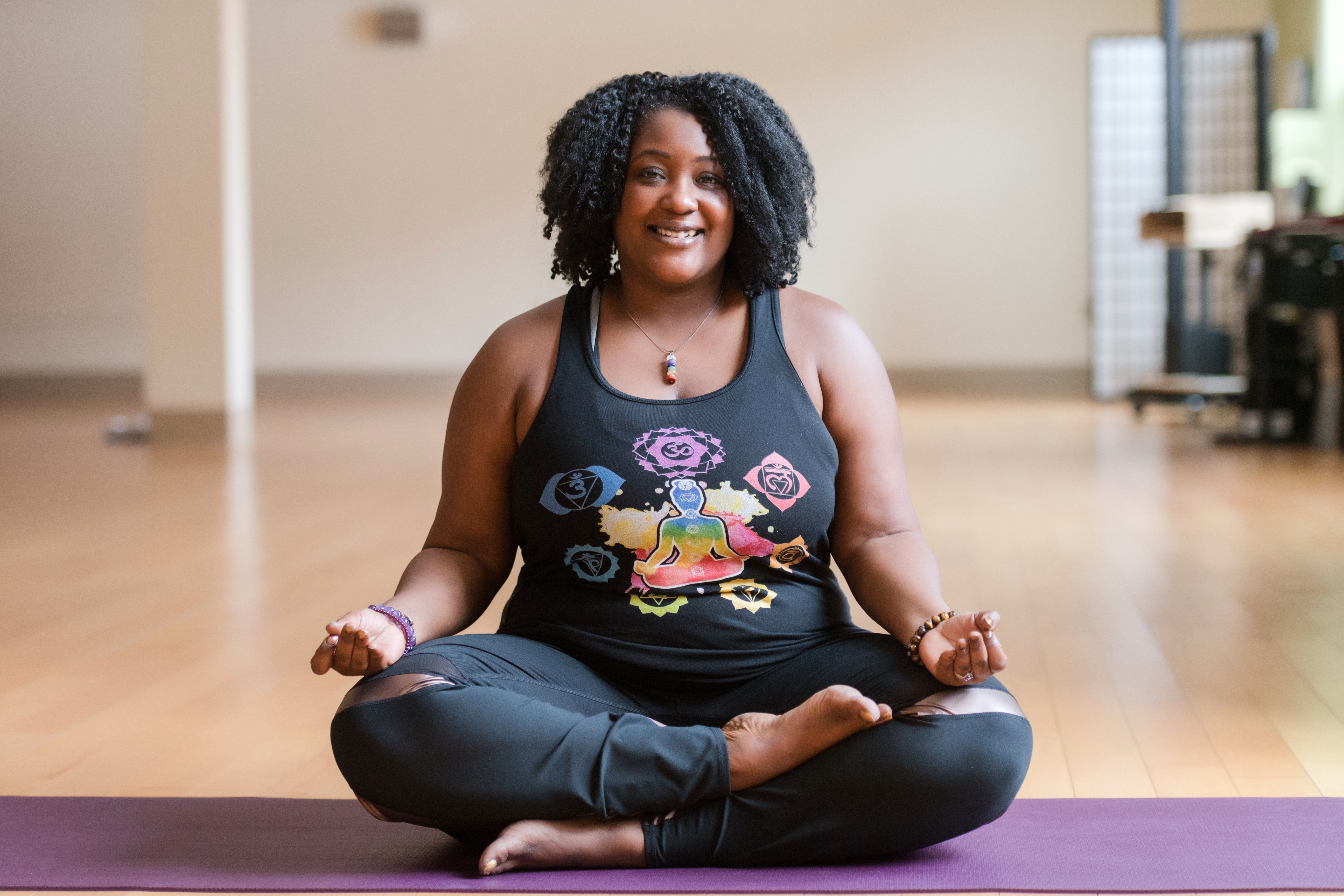
Throughout your 800-hour training, you will gain knowledge and understanding of the philosophy, theory, process, and application of yogic postures and techniques that yoga therapy utilizes.
Your training will begin with Foundations of Yoga Therapy Part 1 and Part 2, two modules that provide the essential foundation for integrating the knowledge and skills required to be a Professional Yoga Therapist. Next, you will delve into the In-Depth Anatomy of Asana, learning more about a posture’s function and the body’s structure and movement. Upon successful completion of this module, you will become a 300-hour Advanced Teacher of Therapeutic Yoga, certified to teach yoga classes with a specialized focus on yoga as healing modality.
KSIYT’s experiential curriculum promotes learning by doing. As you continue your 800-hour path to becoming a certified yoga therapist, you’ll engage in advanced courses designed to further your skills for working in medical settings, and complementary health settings. Courses include Yoga Therapy Applied in Medical Settings, Yoga Therapy Applied in Mental Health Settings; Pranayama, Mudra, and Subtle Anatomy Applied in Yoga Therapy; and Uniting Yoga and Ayurveda. In addition, you will receive individualized mentoring from KSIYT faculty as you deliver yoga therapy sessions under clinical supervision in both the Clinical Immersion and Mentored Practicum.

Foundations of Yoga Therapy Part 1 (103 hours)
Foundations Part 1 provides an overview of the yoga therapy field and the methodology-specific KSIYT. You will learn the philosophical underpinnings of the evolution of yoga therapy in India and in the West, as well as a survey of the various tools used in yoga therapy, such as asana, pranayama, mudra, yoga nidra, guided relaxation, and imagery.
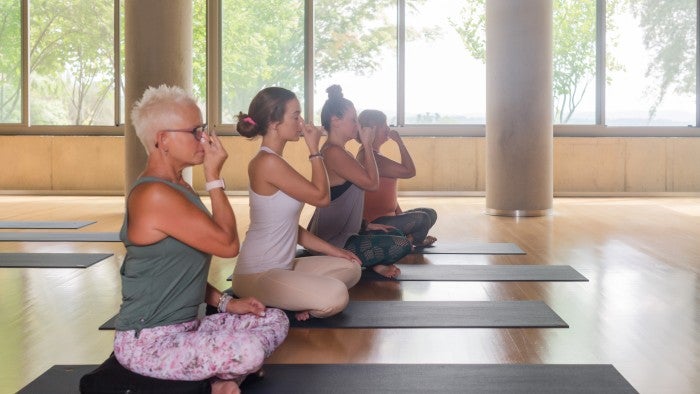
Foundations of Yoga Therapy Part 2 (103 hours)
Foundations Part 2 continues the overview of the yoga therapy field begun in Foundations Part 1. You will gain biomedical knowledge relevant to the field of yoga therapy. Additionally, you will explore lifestyle-related imbalances and learn intake and assessment skills to develop a therapeutic approach to healing through yoga.

In-Depth Anatomy of Asana (75 hours)
This module is a comprehensive exploration of physical asana as it relates to the practice of yoga therapy. With instruction in concepts of motion as well as advanced study of anatomy and physiology, you will gain a more in-depth understanding of asana and anatomy ready to support a variety of body types and abilities with yoga therapy.
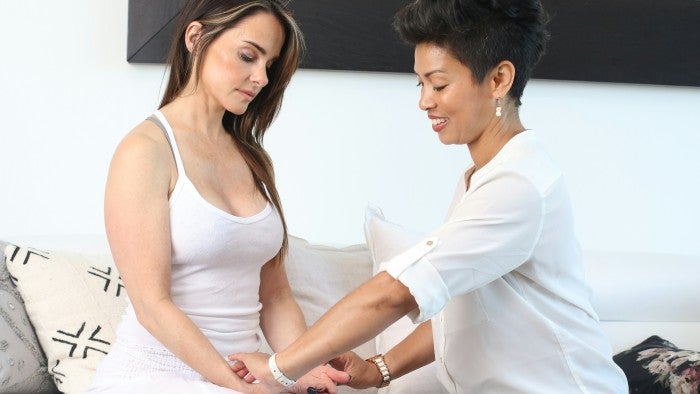
Clinical Immersion (50 hours)
Clinical Immersion is the first step to delivering yoga therapy sessions under the guidance of a clinical team. This six-day on-campus training consists of 25 hours of yoga therapy delivery and 25 hours of mentoring and skill building.
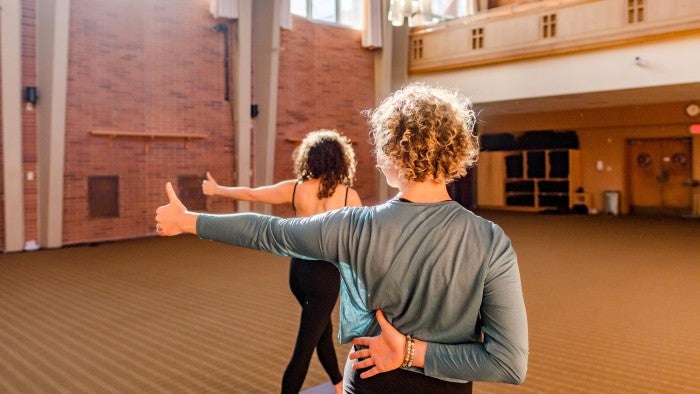
Mentored Practicum (169 hours)
The Mentored Practicum is a distance-learning model in which you will deliver yoga therapy in one-on-one and group sessions. You will be paired with a mentor who helps guide you through the module's clinical coursework. Apply here.

Yoga Therapy Applied in Medical Settings (75 hours)
In this module, you will gain basic knowledge of many of the more common manifestations of disease in the West, including metabolic syndrome and diabetes, autoimmune disorders, respiratory illnesses such as asthma and COPD, and Parkinson’s and Alzheimer’s.
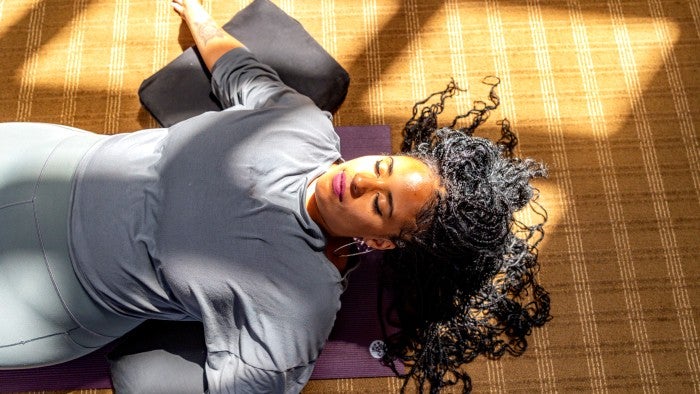
Yoga Therapy Applications Within the Mental Health Field (75 hours)
This module explores the application of yoga therapy in the mental health field examining all-too-common conditions such as depression, anxiety, and addiction. You will learn from experts blending yoga philosophy, western psychology, and best practices to understand the conditions of the mind.
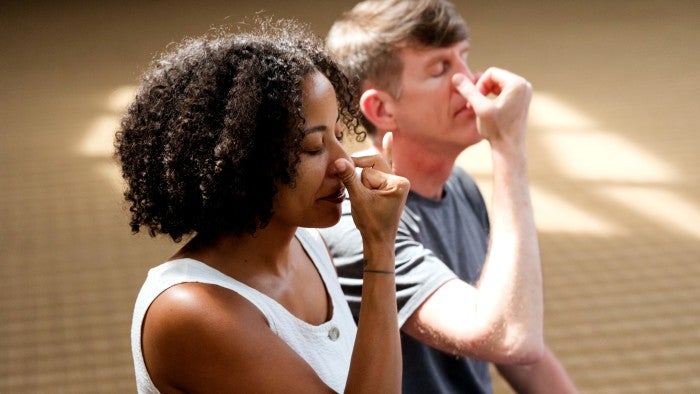
Pranayama, Mudra, and Subtle Anatomy Applied in Yoga Therapy (75 hours)
This module builds from the introduction to pranayama and subtle anatomy and explores pranayama and the realm of subtle anatomy with more depth and breadth. You will learn to navigate the nadis, chakras, and prana vayus of the body, as well as how to incorporate mudras into your yoga therapy consults.
Uniting Yoga and Ayurveda (75 hours)
This course deepens your knowledge of the relationship between yoga and Ayurveda, with classes focused on cultivating prana (life force), agni (inner fire), and ojas (vigor). Participate in daily sadhanas, carve silent time for self-study, and integrate your skills in insightful supervised practicums.
Content Hours
Our accredited yoga therapy training program is in line with the current IAYT Educational Standards.
| Prerequisite Requirements | |
| 200-Hour Yoga Teacher Certification Hours | |
| One year of personal practice | |
| One year of teaching experience | |
| Therapeutic Yoga Course Hours | |
| Foundations of Yoga Therapy Part 1 | 103 hours |
| Foundations of Yoga Therapy Part 2 | 103 hours |
| In-Depth Anatomy of Asana | 75 hours |
If you already have the Kripalu 300-hour Advanced Teacher of Therapeutic Yoga Certificate, start here:
The modules below can be taken in any order once you complete the above modules:
| Clinical Immersion | 50 hours |
| Mentored Practicum | 169 hours |
| Mudra and Pranayama Therapeutic Applications | 75 hours |
| Uniting Yoga and Ayurveda | 75 hours |
| Yoga Therapy Applied In Medical Settings | 75 hours |
| Yoga Therapy Applied In Mental Health Settings | 75 hours |
| Total | 800 hours |
In-Depth Anatomy of Asana | ON CAMPUS
October 3–12, 2025
Clinical Immersion | ON CAMPUS
October 12–19, 2025
Yoga Therapy Applied In Medical Settings | ONLINE
October 22–December 13, 2025
Do I need a 200-hour yoga teacher certificate to apply for this training?
Yes, a 200-hour yoga teacher certificate is a prerequisite for this training. Additionally, this KSIYT 800-Hour track requires one year of yoga teaching experience as well as a year of personal sadhana practice.
Does my 200-hour yoga teacher certificate have to be from the Kripalu School of Yoga?
No, we accept 200-hour yoga teacher certificates from all traditions, as long as the school is registered with Yoga Alliance.
Are KSIYT programs eligible for scholarships?
KSIYT programs are not currently eligible for Kripalu Scholarships.
Do KSIYT modules count toward Kripalu School of Yoga’s 300-Hour or the Kripalu School of Ayurveda’s 300-Hour Ayurvedic Yoga Teacher Training?
No, KSIYT modules only count toward the respective 300-Hour Advanced Teacher of Yoga Therapy Training or the 800-Hour Professional Yoga Therapist Program.
Can I take In-Depth Anatomy of Asana prior to taking Foundations of Yoga Therapy Part 1 and Part 2?
No, you must take Foundations Part 1 and 2 in order, prior to taking In- Depth Anatomy of Asana.
Can I transfer credits from other trainings?
Yes, you can take the Kripalu School of Ayurveda’s (KSA) Uniting Yoga and Ayurveda 75-hour module that is part of KSA’s 300-Hour Ayurvedic Yoga Teacher Training track in place of KSIYT’s Embodying the Principles of Ayurveda in Yoga Therapy 75-hour module.
Is the KSIYT 800-Hour Professional Yoga Therapist Program registered with the International Association of Yoga Therapists?
Yes, the training program is currently accredited under the Kripalu School of Integrative Yoga Therapy.
What do I need to apply?
You will need a copy of your 200-hour yoga teaching certificate or Yoga Alliance RYT registration card as well as one year of teaching experience and one year of personal practice.
How long do I have to complete this training?
The 800-Hour Professional Yoga Therapist certificate training has minimum of two years and a maximum of three years to complete. Extension applications can be made available on a case-by-case basis.
Questions?
Call 413-448-3152 or email kripaluschools@kripalu.org.